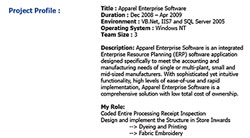
Top stories

ICTToo little, too concentrated: why AI startup funding in Africa needs rethinking
Claire Zanuso 6 hours





More news



ESG & Sustainability
Redisa calls on govt to fix South Africa’s “broken” waste management system
























Some of the most common mistakes we see candidates making include:
1. Applying for jobs for which you aren't qualified
Most employers will have very specific requirements that candidates have to meet. If a job requires you to have 5 years' experience in the hospitality industry, or a Code 10 drivers' license, you shouldn't apply for the position if you don't meet the criteria. Focus on the job that fits your existing skill set and experience. If you have just matriculated and would like to gain experience, why not scout the job ads looking for internship in the industry in which you would like to work? Many companies welcome graduates and would even be willing to make a contribution towards your travelling costs.

2. Applying with a CV that is not up to scratch
Potential employers are put off by bad grammar, SMS type language, and poor spelling - make sure that you thoroughly check your CV before applying. Pages and pages of certificates, supporting documents and referrals are not only unnecessary but also cumbersome to read through. If employers are interested, they will ask you for more information.
3. Applying with weak or biased references
Make sure that whomever you name as a reference will actually give you a positive review should a potential employer contact them for information. Written references rarely work - most recruiters prefer to speak to someone in person. Never give a family member, principal, pastor or friend as a reference - the employer will see them as being biased. A good reference is someone who was your direct superior at work - colleagues usually don't qualify.
4. Applying without investigating the company first
Google has plenty of tips and tricks to help you ace an interview and can give you all the right answers - unfortunately employers read those articles too, and are becoming a lot more discerning! I start off all interviews with a single question: Tell me what you know about my company, and why you would like to work here? As a potential employer, there are certain answers that you definitely do not want to hear, including "I don't know anything about the company", "I applied for so many jobs I can't remember" or perhaps, worst of all, "My mother applied for me". Do your research first. Find out whether or not you will fit into the company's culture.
5. Complaining or focusing on the perks before you even start
Most interviewers end their discussion with a question-and-answer opportunity where candidates can make inquiries about any aspects of the job about which they aren't clear. I cringe when applicants use that time to dictate their terms for working hours or leave, rather than ask about the job, the company, and our expectations. Show your passion and interest in the job and the people with whom you will be working. Rephrase questions such as "How long before I get a promotion?" by asking, "Does the company allow room for growth?" Rather than asking, "Can I get extra leave?", ask whether or not the company allows for flexible work schedules. Your goal is as much to interview the company as it is to interview you - use your opportunity to do so wisely.
6. Not looking the part
The working world is a lot more casual than it was a few years ago and most employers don't expect you to show up for an interview in your suit and tie, but you should still look neat. Cover up tattoos, remove piercings, and look as professional as you would like to be taken. And whilst it's great that your mom or friends support you, they shouldn't tag along to interviews - it makes it seem as though you aren't quite as independent as an employer might like!
And lastly, don't get discouraged. It's not unusual to be rejected a few times and every interview counts as great practise for the next one. Use your mobile phone or Internet connection to keep an eye on the job classifieds - the right job for you is right around the corner. [But turn your mobile off before you go in for your interview - Editor]
